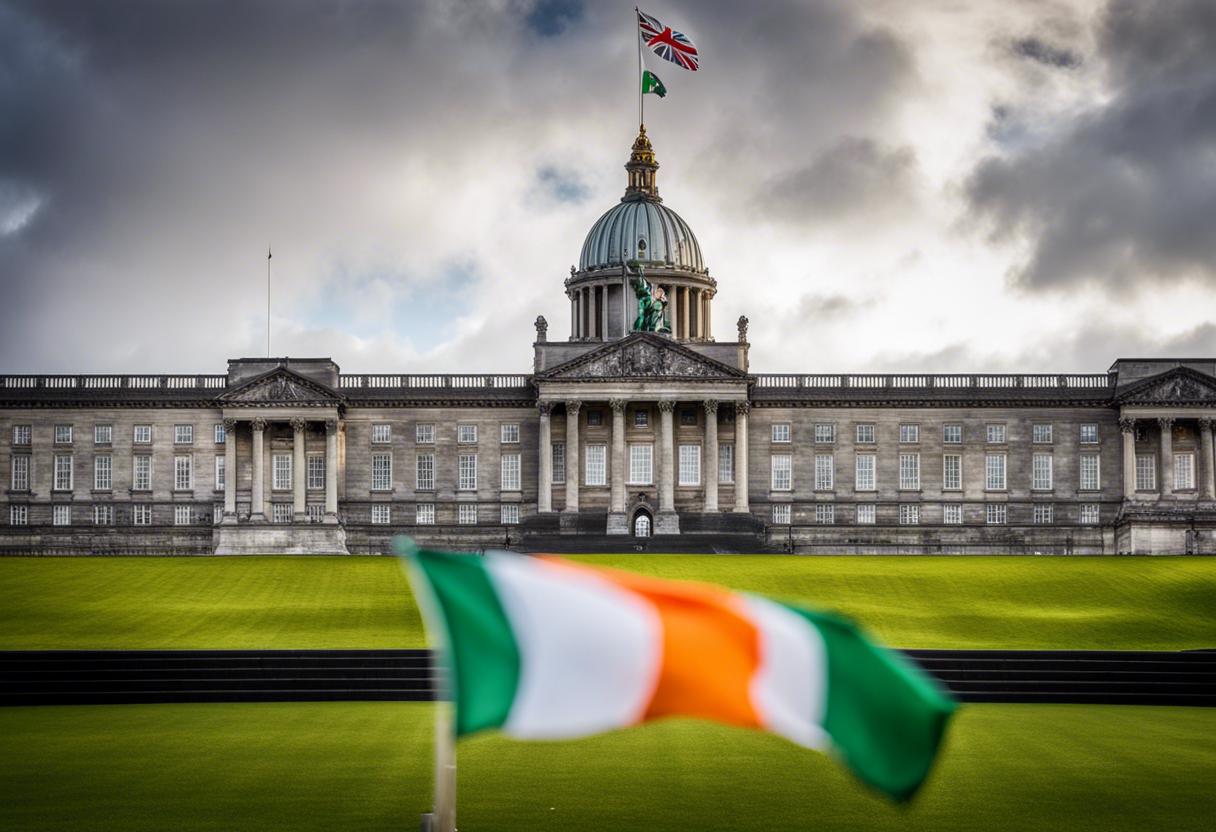At present, a dispute between Rishi Sunak and the Irish government regarding immigration regulations seems beneficial for the former, especially given the shaky confidence the Conservatives face due to their perceived weakness on this matter. This weakness has been exploited by the populist Reform UK party, whose support is on the rise ahead of an imminent general election.
Indeed, when Ireland expresses its discontent about the substantial increase in immigration, a consequence of his Rwanda policy, Sunak seizes the opportunity to hail his policy’s success. By bluntly announcing the absence of any “returns policy” from Ireland, Sunak assures that his stringent immigration restrictions are yielding positive results. This controversy is not about sparking a permanent, damaging altercation with Ireland, but about Sunak’s attempt to steer clear of a disastrous defeat in parliament that could herald a long-term rule of the Labour party.
The Irish government, likely recognising this, is also wrestling with its own pressing election issues and refugee challenges. These struggles appear to be spurring the growing wave of new-generation populism seen throughout the European Union. Consequently, it is important for the government to be perceived as taking a firm stand against the UK. As recently stated by the Taoiseach, the country has no intention of letting another’s migration strategy compromise their own, refusing to serve as a backdoor for the migratory problems of others.
In contrast, some unionist groups in Northern Ireland find pleasure in the situation. Their recent humiliation when they felt ousted by Leo Varadkar during the post-Brexit boundary negotiations is still fresh. They take pleasure in seeing the open border policy campaigned by the Irish now serve as an entry path for migrants coming from Britain, a country which appears less hospitable to them following the Rwanda law.
Jim Allister, leader of the Traditional Unionist Voice party, which opposes the protocol and a border in the Irish Sea, has voiced apprehension that stems from the 1972 suspension of the Northern Ireland parliament. Allister warns of the British government potentially shifting the immigration border to the Irish Sea once again, an action he believes would be desirable for Dublin.
However, I remain unconvinced that either Dublin or London anticipate such a move. Unionism has managed to grudgingly accept the Northern Ireland protocol and reintegrate into the Assembly. Introducing an immigration border to the already fraught situation could push political and electoral unionism to disengage entirely from the Belfast Agreement institutions, a course of action that neither government favours. I do not foresee the current discord leading to such repercussions.
Part of the issue at hand lies with Ireland’s, supported by the EU and US, insistence on maintaining an open border after Brexit. The challenge lies in preserving openness for certain aspects while controlling others. Many Irish citizens may initially have been content with an open border post-2016, yet how many will remain so if it results in an influx of refugees and immigrants seeking escape from Britain?
GB News, the favoured channel for Reform UK, discontented Conservatives, and various right-leaning constituents, frequently conveys that its viewers may welcome an open border in a nearby country with no strict immigration policy, conveniently offloading Britain’s refugee and immigrant issue. UK political right-wing figures like Nigel Farage and ex-Prime Minister Liz Truss often attribute the protocol troubles to the Irish and would likely be unsympathetic should Ireland face consequences of their so-called actions.
Given the significant high stakes of the Belfast Agreement, it is unlikely that either government would allow the situation to escalate to the point of complete collapse. Both parties understand the unique historical circumstances that led to establishing the agreement between the mid-1990s and 1998, implying a failure of such magnitude could severely impact the existing political stability and even spark renewed hostilities in a worst-case scenario.
Over the past half-century, governments have often sought customised resolutions for new challenges—resolving them without losing face and while preserving most existing frameworks and agreements. Examples of this pattern include the Anglo-Irish Agreement (1985), the Downing Street Declaration (1993), the Belfast Agreement (1998), the Northern Ireland protocol (2019), and the Windsor framework (2023). It’s a testament to continuous efforts to avoid crises through bipartisan collaboration.
In light of this, behind-the-scenes discussions are likely taking place currently. It’s in favor of not only the incumbents but also their potential successors following the general elections. It could also bring the added bonus of the UK being seen as standing firm against Eire—an act likely to be appreciated by many unionists in both countries. Likewise, Ireland would want to maintain a strong stance against the UK whilst charting an exit strategy for the influx of new immigrants.
Ascending to solve the disagreement (referring to it as a crisis would be an exaggeration) is a mutual objective between them and eventually, a compromise will be reached. The endorsement from the Irish and EU acknowledging that the UK and Northern Irish Unionists did have a valid argument on the issue of unrestricted borders post-2016 could become beneficial for negotiations.
Alex Kane, a Belfast-based commentator, and former director of communications for the Ulster Unionist Party, provides these insights.

